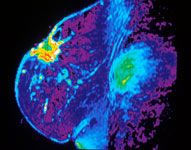Neratinib Reduces Incidence of CNS Mets, Fails to Improve PFS Over Trastuzumab in HER2-Positive Breast Cancer
Frontline treatment with neratinib and paclitaxel demonstrated similar ORR and PFS as trastuzumab and paclitaxel while lowering the incidence of CNS metastases in patients with locally recurrent or metastatic HER2-positive breast cancer.
Source: Dr. Steven Harmes. Baylor University Medical Center, Dallas Texas, The Web site of the National Cancer Institute (http://www.cancer.gov).

Color-enhancement show magnetic resonance image (MRI) of individual breast.
Source: Dr. Steven Harmes. Baylor University Medical Center, Dallas Texas, The Web site of the National Cancer Institute (http://www.cancer.gov).
Frontline treatment with neratinib (PB272) in combination with paclitaxel demonstrated similar objective response rates (ORR) and progression-free survival (PFS) as the combination of trastuzumab (Herceptin) and paclitaxel while lowering the incidence of central nervous system (CNS) metastases in patients with locally recurrent or metastatic HER2-positive breast cancer.
Patients treated with neratinib plus paclitaxel were 52.6% less likely to develop a CNS metastases compared with those treated with trastuzumab plus paclitaxel. The incidence of CNS metastases with neratinib was 7.4% compared with 15.6% with trastuzumab (P= .006). A statistically significant difference between PFS and ORR was not identified in the study. The median PFS with neratinib was 16.6 versus 16.7 months with trastuzumab (P= .35). The ORR with neratinib was 74.8% compared with 75.1% with trastuzumab (P= .94).
Top-line results from the phase II NEfERTT study were released by Puma Biotechnology, the company developing the drug. Full results from the NEfERTT trial will be presented in 2015, according to the company.
“As expected, there was no statistically significant difference in progression free survival and objective response rate for the paclitaxel plus neratinib arm compared to the paclitaxel plus trastuzumab arm," Alan H. Auerbach, chief executive officer and president at Puma Biotechnology, said in a statement. "However, the paclitaxel plus neratinib arm showed a statistically significant decrease in the incidence of CNS metastases compared to the paclitaxel plus trastuzumab arm.
The NEfERTT trial randomized 479 patients with locally recurrent or metastatic HER2-positive breast cancer to receive paclitaxel plus the HER2-targeted TKI neratinib or trastuzumab. The primary endpoint of the trial was PFS, with secondary outcome measures focused on ORR and CNS metastases, which included brain metastases. In the trial, approximately 30% of patients receiving neratinib experienced grade 3 diarrhea compared with 4% with trastuzumab. The trial was not designed to administer antidiarrheal agents. However, in studies exploring neratinib as monotherapy, treatment with loperamide effectively reduced the rate of grade 3 diarrhea with single-agent neratinib to approximately 8%. In a statement, Puma noted that high-dose loperamide has been incorporated into all ongoing studies exploring neratinib.
“We are very pleased with the results of the NEfERTT trial with neratinib,” Auerbach said. "This represents the first randomized trial with a HER2-targeted agent that has shown a statistically significant reduction in the incidence of CNS metastases, which we believe provides a meaningful point of differentiation for neratinib in the treatment of HER2-positive breast cancer."
In July, Puma announced that adjuvant treatment with neratinib demonstrated a statistically significant prolongation in disease-free survival (DFS) compared with placebo for patients with HER2-positive breast cancer following prior treatment with adjuvant trastuzumab. These findings came from the phase III ExteNET trial that enrolled 2821 patients following surgery and adjuvant trastuzumab.
In the study, patients were randomized to 1-year of placebo or neratinib. Overall, extended adjuvant treatment with neratinib prolonged DFS by 33% compared with placebo (HR = 0.67;P= .0046). When including ductal carcinoma in situ, DFS was improved by 37% with neratinib compared with placebo (HR = 0.33;P= .0009). Based on these findings, Puma announced plans to submit a new drug application to the FDA in 2015.
The drug continues to be explored as a treatment for patients with breast cancer and other solid tumors, including colorectal cancer and non-small cell lung cancer (NSCLC).
According to a late-breaking abstract presented at the 2014 ESMO Congress, the combination of neratinib and the mTOR inhibitor temsirolimus demonstrated a partial response in 21% of patients (n = 3) with HER2-mutated NSCLC. The median PFS with the combination was 4.0 months.